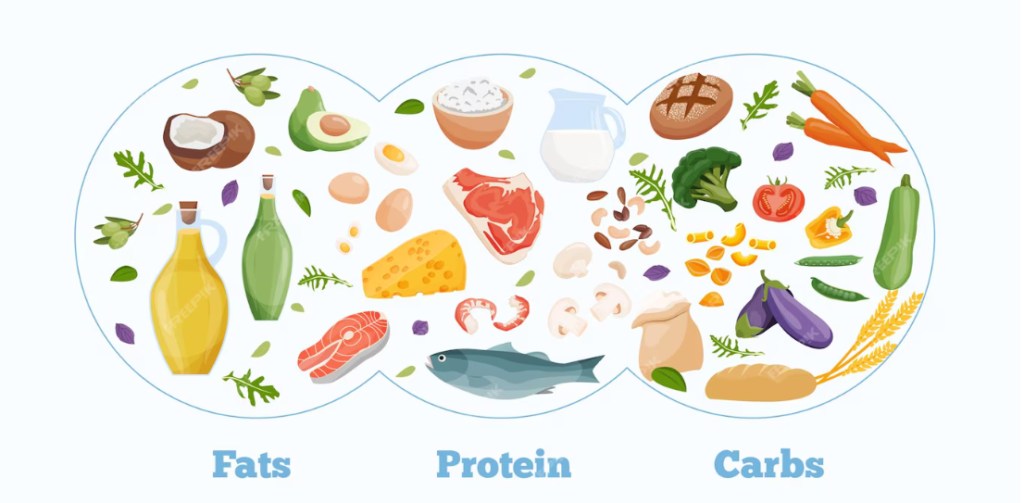It investigates the critical role of macronutrient balance for health(carbohydrates, proteins, fats) in
producing a balanced diet. This guide goes into the functions of each
macronutrient, determining optimal ratios for different health goals and
incorporating these ideas into daily living, tackles common misconceptions and
provide practical guidance for altering intake to improve general well-being and
performance.
Table of Contents
Introduction:
As for nutrients, there are two major categories, macros and trace elements.
Major nutrients are nutrients that people regularly need in large quantities to
provide the body to fulfill their body functions and daily activities.
Most commonly, macronutrients simply refer to protein, carbohydrates,
and fat, but some people may also include other nutrients that we need in large
amounts, such as water.
Most of your body’s energy and calories come from macronutrients.
Each type of macronutrient has its own benefits and purposes for maintaining a
healthy body. The exact amount of each macronutrient a person needs can vary
based on individual factors such as weight, age, and pre-existing health conditions.

Carbs: “fuel for energy and performance”
Carbs are specialized compounds that include sugar, starch, and nutrients. In order
to supply energy for bodily functions, the body breaks them down into glucose.
Plant foods contain the majority of carbohydrates. Additionally, lactose, a type of
milk sugar, is present in dairy products. Bread, pasta, beans, rice, cereals, potatoes,
and other foods are high in carbs.
Proteins: “Building blocks of health
Protein is made up of lengthy chains of molecules known as amino acids. They
are vital to the cellular growth, development, maintenance, and repair of bodily
tissues.
Every bodily cell contains protein, and maintaining the health of the muscles,
bones, and tissues depends on consuming enough of it. Additionally, protein is
essential for many biological activities, including those that nourish and maintain
cells, help the immune system.
Fats: “Essential components” An essential component of a diet, fats can give the body energy. Dietary fats are an integral part of the diet and are involved in the creation of hormones, cell growth, energy storage, and the absorption of vital vitamins, even if some types may be healthier than others.
Role of Carbohydrates in Balanced Diet:
Carbohydrates play numerous key roles in a healthy diet:
1.Carbohydrates are primary source of energy, especially for brain and muscles. They are broken down into glucose, which powers biological functions and physical activities.
2.Carbohydrates, particularly those from whole grains, fruits and vegetables, contain dietary fibers Fiber promote digestion, prevents constipation and maintains a healthy gut microbiota.
3.Fiber in carbohydrates can aid boost nutrient absorption and manage blood sugar levels.
4.Adequate carbohydrate consumption allows proteins to be used for their core tasks of growth, repair and maintenance rather than as a source of energy.

Significance of Proteins and Fats:
In a balanced diet, fats play several key roles:
1.Fats are rich source of energy, containing 9 calories per gram, as opposed to 4 calories per gram from carbohydrates and proteins.
2.Fats aid in absorption of fat-soluble vitamins (A, D, E and K), which are required for many biological activities.
3.They are essential components of cell membrane structure, ensuring that cells function properly.
4.Fats have a role in the creation of hormones and other signaling molecules that control many body activities.
5.They protect and insulate organs while also helping to manage body temperature. In a balanced diet, its crucial to focus on good fats like those from avocados.
Determining Perfect Macronutrient Balance:
First thing to do is clarifying your goals and objectives. For weight loss, eat more protein and fewer carbohydrates. For muscle building, you need to balance more protein with enough carbohydrates and fats.
For maintenance of weight, you have to distribute your intake evenly across macronutrients. The most important job is to calculate daily energy expenditure (TDEE) to determine how many calories are required for weight maintenance.
Targets:
1.Protein should account for 10-35% of your caloric intake.
2.Fats aim for 20-35% of daily calories.
3.Carbohydrates should account for 45-65% of daily calorie intake.
Tools for determining optimal Macronutrient Amounts:
- MyFitnessPal
- Lose It!
- Cronometer
- IIFYM (If It Fits Your Macros) /Macro calculator
Macro Calculator:
Based on your weight and amount of daily activity, a macro calculator provides an easy way to calculate how much macronutrients (protein, carbs, and fats) your body needs each day. You can set daily targets for three goals with the aid of the macro calculators: 1. reduction in weight
- gaining weight
- General well-being and maintaining a healthy weight

Addressing common misunderstandings about Macronutrients:
Our general health depends on the macronutrients—fats, proteins, and carbohydrates—but there is a lot of false information out there. To dispel some frequent misconceptions, here’s a summary:
Myth about Carbohydrates: All carbohydrates are unhealthy and lead to weight gain.
It’s true that the main source of energy is carbon. Fruits, vegetables, whole grains, and legumes are rich sources of these minerals and fiber. Selecting complex carbohydrates, such as whole grains, rather than simple carbohydrates, such as sugary snacks, is essential for improved health and longer-lasting energy.
Misunderstanding about Protein: Gaining muscle requires consuming a lot of protein but the truth is that although protein is necessary for both muscle growth and repair, most people obtain adequate protein from a balanced diet. Not all cases of high protein consumption result in increased muscle growth
.
Fats Myth: Not all fats are created equal but the fact is that the hormone production and proper cell function depend on fats for overall health. The secret is to avoid processed food’s saturated and trans fats and emphasize heart-healthy fats, such as those in fish, avocados, nuts, and seeds.
Harmony and Moderation Misunderstanding: Some macronutrients must be completely avoided. An appropriate diet comprises of all three macronutrients in the proper amounts. Personalized demands, activity levels, and health goals can all influence the ideal balance. For optimum health, moderation and diversity are crucial.
Realistic Advice: Read labels to learn the sources of your proteins, lipids, and carbohydrates.
Controlled Portion: Pay attention to serving sizes, particularly for items with more calories, such as fats.
Dynamic Modifications: Tailoring Macronutrients to Your Lifestyle Interpretation:
This section focuses on how to adjust the ratio of carbohydrates, proteins, and fats in your diet to suit your unique needs and circumstances.
Why This Is Significant: To stay healthy and reach your goals, you may need to modify the amount of carbohydrates, proteins, and fats you eat when your life changes due to altered activity, health issues, or weight fluctuations.
Method of Operation:
Variations in Activity Levels: Increased Activity: You may require more protein to aid in muscle recovery and more carbohydrates for energy if you start exercising more or have a physically demanding job.
Less Activity: To preserve balance without gaining too much weight, you may require fewer carbohydrates and a greater emphasis on healthy fats and proteins if you lead a sedentary lifestyle.
Modifications in Health: Handling Weight: By modifying your macronutrient ratios can assist if you’re attempting to acquire or lose weight. For instance, if you want to lose weight without sacrificing muscle, you can increase protein and decrease carbohydrates.
Health problems: Your needs for macronutrients may change if you have certain health problems, such as diabetes or heart disease.
Monitoring and Adjusting: Follow Your Development: Means observe how your energy, mood, and general health are impacted by the macronutrient balance you now have.
Make Sensible Adjustments: If necessary, modify your diet in light of what you see. A change in carbohydrate intake may be necessary if you find yourself lacking energy. Adjusting your protein levels may be necessary if you’re not getting the desired outcomes.
In short, your diet should change along with your life as it does, whether that’s due to increasing activity, health problems, or other circumstances.

Planning:
Meal planning enables you to maintain a balanced diet and ensures that you receive the proper nutrients.
Steps to Take:
- Create a balanced meal plan.
- Combine diverse foodsthat incorporates different foods such as grains, veggies, proteins, and healthy fats in each meal. This ensures that every meal provides a variety of nutrients.
- Make a plan for the upcoming week’s meals. Make a daily plan for your meals for breakfast, lunch, dinner, and snacks. This aids in maintaining organization and preventing impulsive, unwise decisions.
- To make sure you get what you need and steer clear of impulsive purchases, make a shopping list based on your meal plan.
Tips for Meal Preparation:
1. Prepare food in bigger batches and portion it out. This ensures you have healthy options available and saves time over the week.
2.To avoid boredom and make meals interesting, try experimenting with different ingredients and dishes. Additionally, it broadens your intake of nutrients.
In a nutshell, meal planning is the process of organizing your food so that each meal is well-balanced and contributes to your overall health objectives. It’s simpler to eat properly and enjoy your meals when you plan, prepare, and organize.

Expert Guidance: When to seek Professional Advice:
Sometimes you need customized guidance to address particular health issues, objectives, or dietary requirements.
When and why to Consult an Expert/ Dietitians:
- Dietitians can assist you in developing a diet plan that will effectively manage medical disorders such as high blood pressure, diabetes, or food allergies. To assist your overall treatment plan and enhance your quality of life, a nutritionist can offer specific advice for persistent health problems.
- A nutritionist may assist you in creating a plan that works for you and setting realistic objectives if you’re attempting to gain or lose weight and are unsure how to change your diet.
- A nutritionist can help you customize your macronutrient intake to maximize performance and recovery if you’re an athlete or wanting to gain muscle.
4.Seeking guidance on diets, supplements, or the proper ratio of macronutrients, A specialist can help you sort through the conflicting information and determine what is actually best for you based on reliable research.
5. Dietitians can help you plan balanced meals if you’re thinking about following a particular diet (such as veganism, keto, or paleo) and need assistance making sure you satisfy all of your nutritional needs.
6.A nutritionist can assist you in finding appropriate substitutes and ensuring you receive all the nutrients you need if you have dietary sensitivities or intolerances (such as lactose intolerance or gluten sensitivity).
7. A dietician can assist in creating a well-rounded diet for people with particular dietary requirements or preferences, such as vegetarianism or adherence to particular religious dietary standards.
Regular Medical Exam:
Consult a nutritionist on a regular basis to keep on track with your health goals and identify any problems before they become serious, even if you’re typically healthy. A registered dietitian (RD) or registered dietitian nutritionist (RDN) is a qualified practitioner with formal training in dietetics and nutrition. Verify that they hold accredited credentials in their industry. An accredited nutritionist or dietitian can be suggested by your primary care physician. To evaluate their approach and efficacy, look for testimonials or reviews from previous customers.
Conclusion:
The key to mastering macronutrients is figuring out how to promote your general health and wellbeing by consuming the proper amounts of fats, proteins, and carbohydrates. You may construct a diet that successfully fuels your body by knowing the roles played by each macronutrient and how to change their quantities based on your unique needs and goals. You can attain and sustain optimal health with careful meal planning, continual modifications, and professional advice as required. A customized plan is needed to achieve your health goals and feel your best, and balancing macronutrients is not a one-size-fits-all solution.


